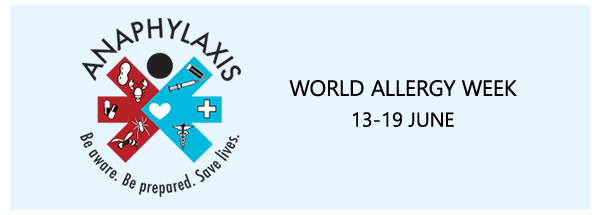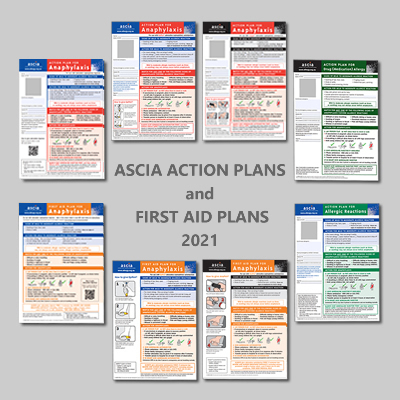It is a pleasure to invite you to participate in the ASCIA 2021 Conference, which is being hosted as a virtual event from Wednesday 1st to Friday 3rd September 2021.
The ASCIA 2021 Conference will provide registered delegates with:
- An international standard of continuing professional development, with the latest research and issues in allergy and clinical immunology presented by more than 60 speakers, including 12 international experts.
- An interactive program that allows delegates to submit questions online during live Q&A sessions.
- Access to all sessions, which will also be available as video recordings on the ASCIA 2021 Conference platform, including concurrent programs for Nurses, Dietitians and Associate Medical Days on Friday.
- Complimentary registration for ASCIA 2021 Conference dinner meetings on Thursday 2nd September which will be held in Adelaide, Auckland, Brisbane, Canberra, Melbourne, Perth and Sydney.
- Opportunities to submit abstracts for posters - accepted posters will be uploaded to the ASCIA 2021 Conference platform and will be published online in a citable medical journal.
- Opportunities for advanced trainees in allergy/immunology to submit abstracts for Clinical Grand Rounds (CGR) - accepted CGR abstracts will be selected for oral presentations.
- Opportunities to present in the CFAR Hot Publications - Food Allergy Research session. Submissions will be made directly to CFAR, not via the ASCIA 2021 Conference website.
- An update on research projects funded from 2015-2019 by the Allergy and Immunology Foundation of Australasia (AIFA).
- Access to updates about new products in sponsored sessions and in the 3D virtual exhibition.
- Exceptional value, with discounted earlybird registration fees that we expect will encourage ASCIA members and other health professionals with an interest in allergy and clinical immunology to register. These reasonably priced fees are possible due to support from ASCIA 2021 Sponsors and Exhibitors.
To register go to https://ascia2021.com/registration.php
To view the program go to https://ascia2021.com/program.php
To submit an abstract go to https://ascia2021.com/abstracts.php
The ASCIA 2021 Conference program includes presentations by 12 international keynote speakers:
- Dr Kimberly Blumenthal (USA)
- IgE Mediated Drug Allergy Reactions
- Prof Wen-Hung Chung (Taiwan)
- T Cell Mediated Drug Reactions and Novel Technologies
- Dr Andrew Gennery (UK)
- TAPID Collaboration from a UK Perspective
- Prof David Khan (USA)
- Re-Labelling Drug Allergy
- Prof Mark Little (Ireland)
- Targeting Subclinical-Immune Pathology in ANCA Vasculitis
- Dr Rosan Meyer (UK)
- Avoidant/Restrictive Food Intake Disorder (ARFID)
- Prof Antonella Muraro (Italy)
- Pathogenesis of Food Allergy
- Prof Elizabeth Phillips (USA)
- Excipient Allergy
- Dr Kathleen Sullivan (USA)
- COVID-19 and Syndromes in Children, Rubella Associated Granuloma
- A/Prof Bernard Thong (Singapore)
- COVID-19 Vaccine Immediate Reactions
- A/Prof Paul Turner (UK)
- Anaphylaxis and Food Allergy, COVID-19 Vaccine Delayed Reactions COVID-19 in 2021 and Beyond, Food Allergy Prevention in 2021 and Beyond
- A/Prof Carina Venter (USA)
- Food Allergy and Diet, Maternal Diet and Food Allergy Prevention in Children.
For more details about these speakers go to https://ascia2021.com/international-speakers.php
The ASCIA 2021 Conference program also features presentations by local keynote speakers, including:
- Dr Katie Allen MP
2021 Basten Oration: A Journey from Benchside to Bedside, and Population to Politics - Why would you do it?
- Prof Anthony Kelleher
- Long COVID
- Prof Connie Katelaris AM
- Climate Change and Allergy
- Dr Jennifer Koplin
– Food Allergy Prevention - EarlyNuts Study Results
- A/Prof Philip Robinson
- Autoimmunity and COVID-19
- Dr Charlotte Slade
- Primary Immunodeficiency in the Adult and Elderly Population
- Prof Mimi Tang
- Food Allergy Treatment - Peanut Allergy OIT Trial Results
- Prof Stuart Tangye
- Immunodeficiency and COVID-19
- Prof Carola Vinuesa
- Neuritin to Prevent Autoimmune Disease and Allergies
ASCIA works in collaboration with other medical specialists and organisations, and this is reflected in the ASCIA 2021 Conference program, which includes the following sessions:
- ASCIA-CFAR (Centre for Food and Allergy Research) Symposium on Wednesday.
- ASCIA-ANZVASC (Australia and New Zealand Vasculitis Society) Symposium on Friday.
- ASCIA Immunodeficiency Strategy for Australia and New Zealand Update on Friday.
- National Allergy Strategy Update on Friday.
We greatly appreciate the support from the ASCIA 2021 Conference sponsors and exhibitors. There will be sponsored sessions each morning and on Wednesday evening, and a 3D virtual exhibition each day.
To view options for support go to https://ascia2021.com/sponsorship-and-exhibition.php
With an outstanding program and innovative virtual format, we expect that the ASCIA 2021 Conference will provide an international standard of education and networking opportunities for ASCIA members and other health professionals with an interest in allergy and clinical immunology.
We look forward to your involvement in the ASCIA 2021 Conference.
Kind regards,
| Prof Michaela Lucas |
|
Jill Smith |
| ASCIA President |
|
ASCIA CEO |
On behalf of the ASCIA 2021 Conference committee:
ASCIA Directors:
Dr Theresa Cole (VIC), A/Prof Jane Peake (QLD), Dr Michael O'Sullivan (WA).
ASCIA Committee Chairs:
Dr Karl Baumgart (NSW), Dr Lara Ford (NSW), Dr Katie Frith (NSW), Prof Connie Katelaris AM (NSW), Dr Kathryn Patchett (NSW),
ASCIA Associate Representatives:
Kathy Beck (QLD), Dr Kathryn Heyworth (QLD), Dr Hannah Hu (NSW), Briony Tyquin (NSW).
Other members:
Dr Tiffany Hughes (SA), Dr Preeti Joshi (NSW), Dr Dean Tey (VIC), Dr Brynn Wainstein (NSW), Dr Melanie Wong (NSW).
Thursday evening dinner meetings (restrictions permitting) will be coordinated by the ASCIA Council Area Representatives for each region:
Dr Andrew Baker (NZ), Dr Elizabeth da Silva (ACT), Dr Narinder Kaur (NSW), Dr Jovanka King (SA), Dr Alberto Pinzon (QLD), Dr Stephanie Richards (VIC), A/Prof Kristina Rueter (WA).
Continue reading

![]() World Allergy Week 2021 Media Release :
World Allergy Week 2021 Media Release : 
 The main change to the 2021 ASCIA Action Plans is that the number of positioning images has increased from three to five:
The main change to the 2021 ASCIA Action Plans is that the number of positioning images has increased from three to five: